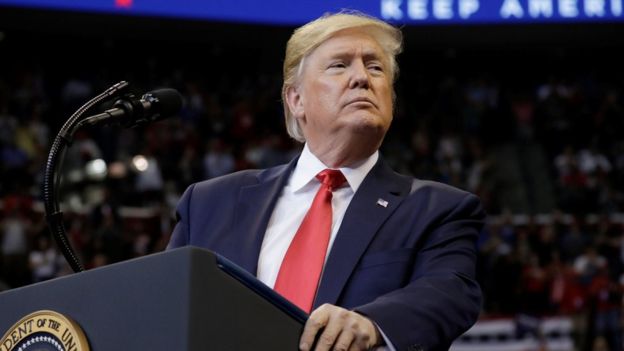Hong Kong protests: Trump signs Human Rights and Democracy Act into law

US President Donald Trump has signed into law a bill that supports pro-democracy protesters in Hong Kong.
The Human Rights and Democracy Act mandates an annual review, to check if Hong Kong has enough autonomy to justify its special status with the US.
Mr Trump said he signed the law “out of respect for President Xi [Jinping], China, and the people of Hong Kong”.
China’s foreign ministry threatened “countermeasures” if the US continued “going down the wrong path”.
Mr Trump is currently seeking a deal with China, in order to end a trade war between the two countries.
“The US has been disregarding facts and distorting truth,” a Chinese foreign ministry statement said.
“It openly backed violent criminals who rampantly smashed facilities, set fire, assaulted innocent civilians, trampled on the rule of law, and jeopardized social order.”
Hong Kong’s government also reacted, saying the American bill would send the wrong signal and would not help to ease the situation.
But a key activist in the Hong Kong protest movement, Joshua Wong, said the US law was a “remarkable achievement” for “all Hongkongers”.
What does the law say?
The bill was introduced in June in the early stages of the protests in Hong Kong, and was overwhelmingly approved by the House of Representatives last month.
It says: “Hong Kong is part of China but has a largely separate legal and economic system.
“The [annual review] shall assess whether China has eroded Hong Kong’s civil liberties and rule of law as protected by Hong Kong’s Basic Law.”
Among other things, Hong Kong’s special trading status means it is not affected by US sanctions or tariffs placed on the mainland.
The bill also says the US should allow Hong Kong residents to obtain US visas, even if they have been arrested for being part of non-violent protests.
What is the situation in Hong Kong?
Hong Kong’s protests started in June against a proposed law to allow extradition to mainland China but it has since transformed into a larger pro-democracy movement.
The protests have also seen increasingly violent clashes, with police being attacked, and officers firing live bullets.
Protesters have thrown petrol bombs and attacked businesses seen as being pro-Beijing.
The protesters, meanwhile, have accused police of brutality.
On Sunday, Hong Kong held local council elections that were seen as a barometer of public opinion towards the government and the protesters.
The elections saw a landslide victory for the pro-democracy movement, with 17 of the 18 councils now controlled by pro-democracy councillors.
What’s happening in Hong Kong today?
Police moved into the Polytechnic University campus where a handful of protesters were thought to be holding out.
The campus was the site of a siege, which turned into one of the defining moments of the anti-government protests.
Police moved in with negotiators and psychologists to convince any remaining students to leave – as well as to clear dangerous items and gather evidence.
It’s not clear whether the officers found any remaining students. Over the past week, most protesters have either surrendered or escaped.
Source:BBC